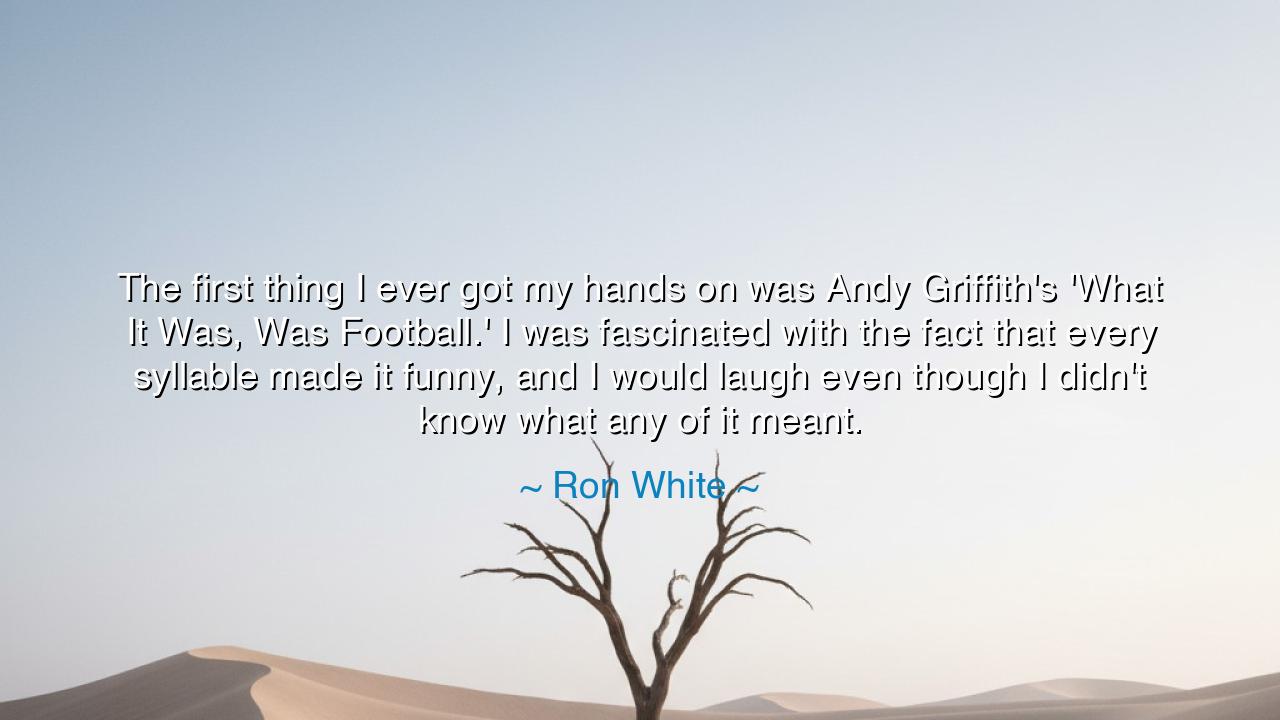
The first thing I ever got my hands on was Andy Griffith's 'What
The first thing I ever got my hands on was Andy Griffith's 'What It Was, Was Football.' I was fascinated with the fact that every syllable made it funny, and I would laugh even though I didn't know what any of it meant.






When Ron White said, “The first thing I ever got my hands on was Andy Griffith’s What It Was, Was Football. I was fascinated with the fact that every syllable made it funny, and I would laugh even though I didn’t know what any of it meant,” he was not merely reminiscing about a childhood memory — he was revealing a profound truth about the power of rhythm, language, and intuition in art. His words remind us that before understanding comes feeling, and before comprehension comes connection. What moved him as a boy was not the logic of the joke, but the music of it — the cadence, the timing, the heartbeat of comedy itself. It is a truth as ancient as poetry: that sound, tone, and rhythm speak to the soul before words ever reach the mind.
In the days of the ancients, the bards and storytellers understood this deeply. The rhapsodes of Greece, reciting the verses of Homer, would enchant crowds not because everyone grasped the full meaning of each line, but because the song of the language carried a spell of its own. The melody of speech has always been sacred. Before the written word, humanity’s wisdom passed through voice, shaped by rhythm and breath. So too, Ron White, as a child, was touched by this old magic — not through analysis, but through awe. He heard Andy Griffith’s voice and felt, instinctively, the harmony between word and laughter, between sound and joy.
“What It Was, Was Football” was a monologue — a single man’s voice describing, in naive wonder, a football game he didn’t understand. Its humor arose not from complex ideas, but from timing and tone, from the playful dance of syllables. White, listening, discovered the ancient principle that art is rhythm before it is reason. The laughter it stirred in him, though he “didn’t know what any of it meant,” was the laughter of recognition — the recognition of beauty hidden in the cadence of human expression. It was as though the laughter was not a reaction to content, but a response to music in motion.
There is a lesson in this that reaches far beyond comedy. The great orators of Rome, such as Cicero, knew that persuasion depended as much on rhythm as on argument. The prophets and poets of old, from the psalmists to the storytellers of India, shaped their speech with repetition and tone, so that truth would echo in the heart even when the meaning was dim. Language is more than information — it is vibration, it is energy. When spoken with harmony, even nonsense can move the spirit. Ron White’s fascination, then, was the awakening of an artist to the mystical power of sound — the discovery that laughter, like music, can bypass understanding and go straight to the soul.
There is also humility in his reflection. He laughed, not knowing what he was laughing at, but trusting the joy that arose. How many of us, as adults, lose that trust? We demand to understand before we allow ourselves to feel. But the child — and the artist — knows that meaning often reveals itself only after surrender. The heart must laugh before the mind explains why. In this way, White’s memory is a reminder to return to innocence, to rediscover that wonder which listens without judgment, that laughter which springs from pure delight in sound and story.
Consider, too, the artist’s journey hidden in his words. From that childhood fascination grew a life devoted to comedy, to the art of making others feel through words. What began as unknowing laughter became a lifelong study of how syllables can build a rhythm, how pauses can carry tension, and how tone can turn truth into joy. Every great performer, from Shakespeare’s jesters to modern comedians, learns this — that mastery begins not with intellect, but with reverence for the mystery of timing. What Ron White first felt, he would later learn to wield — transforming sound into laughter, and laughter into art.
And so, dear listener, the lesson is this: Do not rush to understand before you have felt. When something moves you — a song, a story, a laugh you cannot explain — do not dismiss it for lack of comprehension. It may be your spirit recognizing a truth your mind has yet to name. Let yourself be fascinated by rhythm, by beauty, by sound. Learn as Ron White did — through wonder first, wisdom second. For the greatest art, and the greatest life, is built upon that same mystery: that what touches the heart most deeply often comes before we ever know why.
Thus, remember: meaning is not always the beginning of laughter — sometimes it is its reward. The sacred rhythm of speech, the cadence of joy, is the heartbeat of all human connection. Listen for it in others. Speak it in your own way. And like the young Ron White before his first performance, may you never lose that holy fascination — the joy of being moved by something you do not yet understand, yet know, in your deepest self, to be true.






AAdministratorAdministrator
Welcome, honored guests. Please leave a comment, we will respond soon